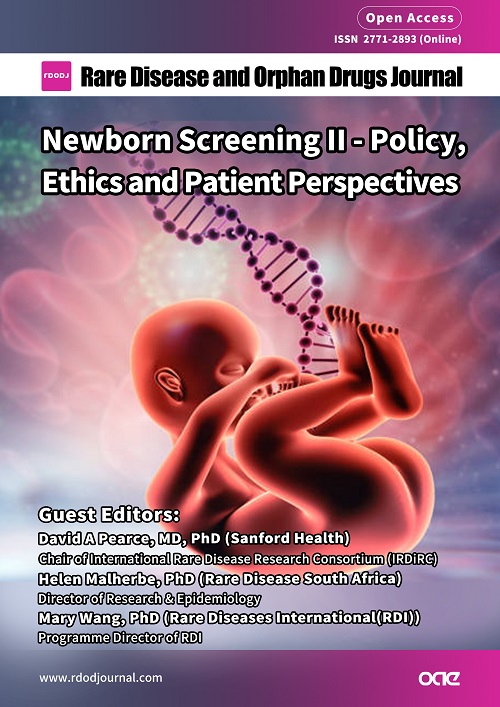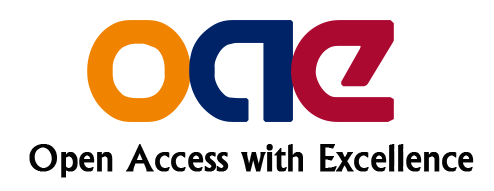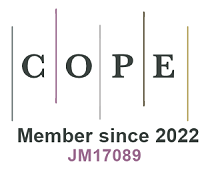
Topic: Newborn Screening II - Policy, Ethics and Patient Perspectives
A Special Issue of Rare Disease and Orphan Drugs Journal
ISSN 2771-2893 (Online)
Submission deadline: 15 Sep 2023
Guest Editor(s)
Prof. David A Pearce
Department of Pediatrics, Sanford School of Medicine, University of South Dakota, Sioux Falls, SD, United States.
Special Issue Introduction
The International Rare Diseases Research Consortium (IRDiRC) was launched in 2011 by a joint effort between the European Commission and the US National Institutes of Health with the vision to enable, through research, all people living with a rare disease to receive an accurate diagnosis, care, and available therapy within one year of coming to medical attention.
To accomplish this ambitious task, IRDiRC has established 3 main goals:
Goal 1: All patients coming to medical attention with a suspected rare disease will be diagnosed within one year if their disorder is known in the medical literature; all currently undiagnosable individuals will enter a globally coordinated diagnostic and research pipeline.
Goal 2: 1000 new therapies for rare diseases will be approved, the majority of which will focus on diseases without approved options
Goal 3: Methodologies will be developed to assess the impact of diagnoses and therapies on rare disease patients
Though much progress has been made towards meeting these goals, much work remains ahead. It is becoming increasingly apparent that newborn screening (NBS) is our greatest weapon in identifying rare diseases early but major challenges exist in implementing national screening programs for all newborns. New emerging technologies, such as next-generation sequencing (NGS), offer the opportunity to screen for genetic disorders through a single test but can pose a challenge in cost, complexity and access to appropriate equipment. In addition, there are ethical considerations of screening newborns for diseases that may not affect them until later life, as well as the potential social stigma. Different cultures may also view NBS in different lights which will often guide national policy that can differ greatly between countries. Taken together, these issues pose a serious challenge to implementing comprehensive NBS programs globally which ultimately impacts on our ability to identify and diagnose rare disease at an early stage.
Given IRDiRC’s goal of shortening the diagnostic odyssey for RD patients, we have brought together international experts to provide insight into the current state of NBS worldwide, highlighting technological advances, as well as the many challenges, to implementing comprehensive screening programs.
To accomplish this ambitious task, IRDiRC has established 3 main goals:
Goal 1: All patients coming to medical attention with a suspected rare disease will be diagnosed within one year if their disorder is known in the medical literature; all currently undiagnosable individuals will enter a globally coordinated diagnostic and research pipeline.
Goal 2: 1000 new therapies for rare diseases will be approved, the majority of which will focus on diseases without approved options
Goal 3: Methodologies will be developed to assess the impact of diagnoses and therapies on rare disease patients
Though much progress has been made towards meeting these goals, much work remains ahead. It is becoming increasingly apparent that newborn screening (NBS) is our greatest weapon in identifying rare diseases early but major challenges exist in implementing national screening programs for all newborns. New emerging technologies, such as next-generation sequencing (NGS), offer the opportunity to screen for genetic disorders through a single test but can pose a challenge in cost, complexity and access to appropriate equipment. In addition, there are ethical considerations of screening newborns for diseases that may not affect them until later life, as well as the potential social stigma. Different cultures may also view NBS in different lights which will often guide national policy that can differ greatly between countries. Taken together, these issues pose a serious challenge to implementing comprehensive NBS programs globally which ultimately impacts on our ability to identify and diagnose rare disease at an early stage.
Given IRDiRC’s goal of shortening the diagnostic odyssey for RD patients, we have brought together international experts to provide insight into the current state of NBS worldwide, highlighting technological advances, as well as the many challenges, to implementing comprehensive screening programs.
Submission Deadline
15 Sep 2023
Submission Information
For Author Instructions, please refer to https://www.oaepublish.com/rdodj/author_instructions
For Online Submission, please login at https://oaemesas.com/login?JournalId=rdodj&IssueId=rdodj2209231
Submission Deadline: 15 Sep 2023
Contacts: Yuna Ding, Assistant Editor, assistant_editor@rdodjournal.com






